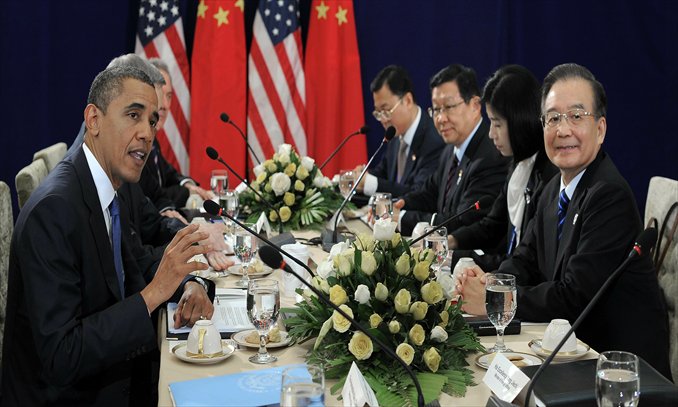Wen calls for ‘positive messages’

Chinese Premier Wen Jiabao, attending the seventh East Asia Summit in Phnom Penh on Tuesday, held talks with US President Barack Obama and urged both countries to send "positive messages" to the world.
A series of Southeast and East Asian regional summits that took place from Sunday to Tuesday in the Cambodian capital were overshadowed by the efforts of countries engaged in territorial or maritime spats with China to "internationalize" the disputes - an approach strongly opposed by China.
During his meeting with Obama, Wen voiced hope that both the US and China "would deliver positive messages to the world" as they have done in the past, such as the mechanisms for the Strategic and Economic Dialogue, High-level Consultation on People-to-People Exchange and the Strategic Security Dialogue.
"It is very important that as two of the largest economies in the world we work to establish clear rules of the road internationally for trade and investment," Obama told Wen, adding China and the US have a "special responsibility" to lead the way on sustained global growth.
Surin Pitsuwan, Secretary-General of the Association of Southeast Asian Nations (ASEAN), said in an exclusive interview with the Global Times that competition between the US and China has been intensifying but that ASEAN would not "choose sides between the two powers."
"ASEAN wants to benefit from the competition while avoiding becoming a victim," Pitsuwan said. "But this is not easy to work out."
In a separate meeting with outgoing Japanese Prime Minister Yoshihiko Noda, Obama received complaints about the "security environment in East Asia."
"I welcome the US policy of placing importance on the Asia-Pacific region," Noda said. "With the increasing severity of the security environment in East Asia, the importance of the Japan-US alliance is increasing."
However, Obama told Noda that the US supports Japan as an ally but wants to "avoid potential escalation" in island disputes with China, the White House said, according to Reuters.
"President Obama's message is there needs to be a reduction of tensions," US deputy National Security Adviser Ben Rhodes said after the East Asia Summit. "There is no reason to risk any potential escalation, particularly when you have two of the world's largest economies - China and Japan - associated with some of those disputes."
Ni Feng, deputy director of the Institute of American Studies at the Chinese Academy of Social Sciences, said there would undoubtedly be some "minor adjustments" in the US Asia pivot policy during Obama's second tenure.
"Obama may place more attention on indirect competition with China by wooing Southeast Asian nations in the next four years, rather than getting deeply involved in territorial disputes in the region, which would certainly further stoke regional tensions," Ni said.
"Moreover, compared with the focus on military and security deployment during his first tenure, Obama is more likely to stress economic diplomacy after he forms a new administration in January," Ni added.
All parties that were attending the annual East Asia Summit understood that they could not afford to allow the disputes hold back lucrative trade agreements, Pitsuwan said.
"The effort is to try to isolate the two issues. Economic integration will have to go forward, because everybody is going to benefit from this new architecture," he said.
China will continue to be an important engine for the regional and global economies, as Chinese economy is becoming more stable and is expected to maintain relatively fast growth, Premier Wen also said at the East Asia Summit on Tuesday.
He said China fully supports ASEAN efforts to push forward the building of the Regional Comprehensive Economic Partnership (RCEP).
Wen called on all countries to grasp new opportunities created by this regional integration process, pursue free and fair trade policies, stick to open markets and firmly oppose all forms of protectionism.
Negotiation on the RCEP will be officially launched at the end of the summit by leaders of ASEAN nations and six key Asia-Pacific countries: China, Australia, India, Japan, South Korea and New Zealand.
Agencies contributed to this story